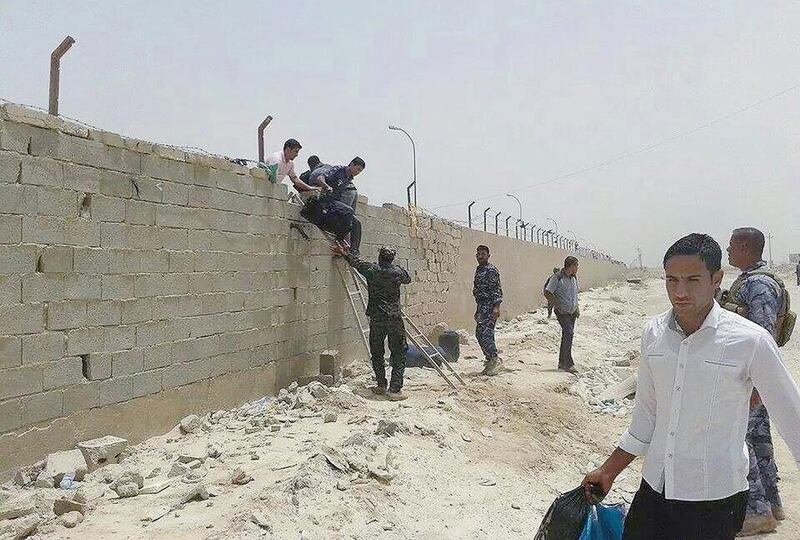BAGHDAD // Militants from an Al Qaeda splinter group stormed a university in Iraq’s restive Anbar province on Saturday, taking students hostage for several hours before withdrawing.
Ali, a 21-year-old political science student, was in the male dormity when the assault began.
“I heard heavy gunfire at the campus,” he said. “As soon as I got out I saw tens of masked gunmen in the vicinity of the dorms. A few had even taken over the car belonging to the president of the university.”
The attack by the Islamic State of Iraq and the Levant (ISIL) on Anbar University comes as Islamic extremists and other anti-government militias have held parts of the nearby provincial capital of Ramadi and the city of Fallujah since December, amid rising tensions between Sunnis and the Shiite-led government in Baghdad.
While shelling and gun battles continue between the militants and government-allied forces, the school, one of the country’s largest, has mostly been left alone while civilians fled the violence.
Ali said the militants headed towards the female dormitory and surrounded the building.
He fled with a few other male students towards the southern gate of the university and climbed over the fence. Female students didn’t try to escape, he said. “It was hard for them to leave anyway.”
Another student, Ahmed Al Mehamdi, was taken hostage by the militants. He awoke to the crackle of gunfire, looked out the window and saw armed men dressed in black racing across the campus. Minutes later, the gunmen entered the dormitory and ordered everybody to stay in their rooms while taking others away, he said.
The Shiite students at the school were terrified, Mr Al Mehamdi said, as the gunmen identified themselves as belonging to ISIL. The Sunni terror group, fighting in Syria with other rebels trying to topple President Bashar Al Assad, is known for massive, bloody attacks in Iraq as well often targeting Shiites that they view as heretics.
Several hours later, gunmen left the university under unclear circumstances. Students then boarded buses provided by the local government to flee the school, though gunfire erupted as security forces attacked retreating militants, police said.
No staff or students were killed or injured during the raid.
“We thank God that this crisis ended almost peacefully and no student was hurt as far as I know,” Mr Al Mehamdi said by mobile phone from inside a bus that took him to safety.
“I think they were trying to frighten us but not kill us,” said Ali. “Had they wanted to they could have done so quite easily.”
Meanwhile, clashes between Iraqi security forces and militants killed 59 people in Mosul on Saturday, as heavy fighting in the northern city entered its second day, officials said.
The dead comprised 21 police and 38 militants, a police lieutenant colonel and a mortuary employee said.
Fighting broke out in Mosul on Friday morning and continued into the night, while twin suicide bombings targeted a minority group east of the city and soldiers shot dead suicide bombers to its south.
Iraq is currently grappling with its worst surge in violence since the sectarian bloodletting of 2006 and 2007, when the country was pushed to the brink of civil war despite the presence of tens of thousands of US troops.
More than 900 people were killed last month, according to figures separately compiled by the United Nations and the government. So far this year, more than 4,400 people have been killed.
Officials blame external factors for the rise in bloodshed, particularly the civil war in neighbouring Syria.
ISIL and their allies seized Fallujah and parts of Ramadi in late December after authorities dismantled a protest camp of Sunnis angry at what they consider their second-class treatment by the Shiite-led government. Fearful of setting off violence, security forces withdrew from the area, allowing militants to seize the cities. In April 2013, a similar dismantling of a Sunni protest camp in Hawija sparked violent clashes and set off the current upsurge in killing.
The government and its tribal allies are besieging the rebel-held areas, with fighting reported daily. Tens of thousands have fled the violence.
Late on Saturday, more than 60 people were killed in a wave of car bombs across the Iraqi capital, security and medical sources said.
The deadliest blast took place in the Bayaa district, where a car bomb exploded, killing 23 people, many of them young people playing billiards.
* Associated Press, Reuters and Agence France-Presse with additional reporting by Hadeel Al Sayegh





